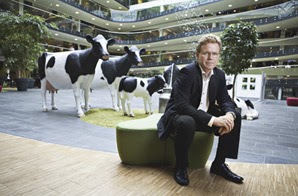true African visionary, former South African President, Rolihlahla
“Nelson” Mandela. As a young boxer, Mandela would frequently train at his local
Soweto YMCA. During this time the centre was frequently used for
ANC political meetings, serving as a safe place for discussions which would
ultimately shape Mandela’s young mind, and South Africa’s future.
Decades later, his influence is still felt within those historic walls as youth
continue to visit the centre and shape their own thinking and
development.
Mandela led South Africa through her greatest challenge, ensuring that the
revolutionary end to institutionalised discrimination and repression,
Apartheid, was met with relatively little conflict and welcomed with a determined
spirit of peace and reconciliation.
While the world will feel the loss of such a remarkable man, Africans have lost a
leader who steadfastly worked to prove that the continent is capable
of peaceful conflict resolution through leadership that aspires to moral honesty,
tolerance and acceptance.
Born on 18 July, 1918, to the Madiba clan of Mvezo in the Transkei, Mandela spent
much of his life striving to educate himself and standing in
political opposition to an unjust system. His stand against seemingly insurmountable
prejudice is a cause for which he sacrificed much in the face of
great threat to his life and freedom. Following a conviction for sabotage and
conspiracy to overthrow the government, Mandela spent 27 years in
prison, but throughout this time maintained a strong loyalty to peaceful resistance
and the unconditional repealing of the Apartheid system. Following
his release in 1990, Mandela guided South Africa through her first democratic
elections and stepped in as South Africa’s first African statesman
when he shouldered the presidency in 1994. Perhaps his most significant contribution
to African politics is the implementation of South Africa’s
first constitution which is perceived world-wide as one of the most forward thinking
constitutions in global governance today.
Since then, Mandela has received more than 250 awards, many for his humanitarian
work, including the US Presidential Medal of Freedom and the Soviet
Order of Lenin. His work has been internationally recognised through his awarding of
the 1993 Nobel Peace Prize which he shares with former Apartheid
president F.W. de Klerk.
The contribution Mandela played in African politics will forever stretch far beyond
the current South African landscape. His legacy to Africa is true
leadership that is both thoughtful and honest but does not prize retribution and
corruption. Mandela ensured that the African Renaissance has a
framework for peaceful conflict resolution and that in all things, human rights
becomes a principle of long-lasting social evolution.
We mourn together as Africans, in much the same way that we celebrated together the
achievements that Madiba brought through his actions. We are a
better continent today through his determination, sacrifice and unflinching faith in
an Africa capable of peaceful change.
Nelson Mandela never wavered in his devotion to democracy, equality and learning.
Despite terrible provocation, he never answered racism with racism.
His life has been an inspiration to all who are oppressed and deprived, to all who
are opposed to oppression and deprivation.
Mandela is survived by his wife, Graca Machel, 3 children, Pumla Makaziwe Mandela,
Zenani Dlamini and Zindzi Mandela, 17 grand-children and 14
great-grandchildren.
Our thoughts also go to the extended family of his late former wife Evelyn Mase and
his former wife Winnie Madikizela.
As we mourn our deep loss, let us pledge to ensure that Mandela’s legacy lives
through us and that our children are able to fully appreciate the
freedoms he and his peers fought so hard to attain.
Carlos Sanvee, AAYMCA General Secretary
Sipho Sokhela, South Africa YMCA National General Secretary
The Africa Alliance of YMCAs (AAYMCA) is a leading pan African youth development
network on the continent, representing national movements in 20
countries, 16 of which are very active. The first YMCA in Africa was established in
Liberia in 1881, and the AAYMCA was founded in 1977 as the
umbrella body for all national movements on the continent. www.africaymca.org













